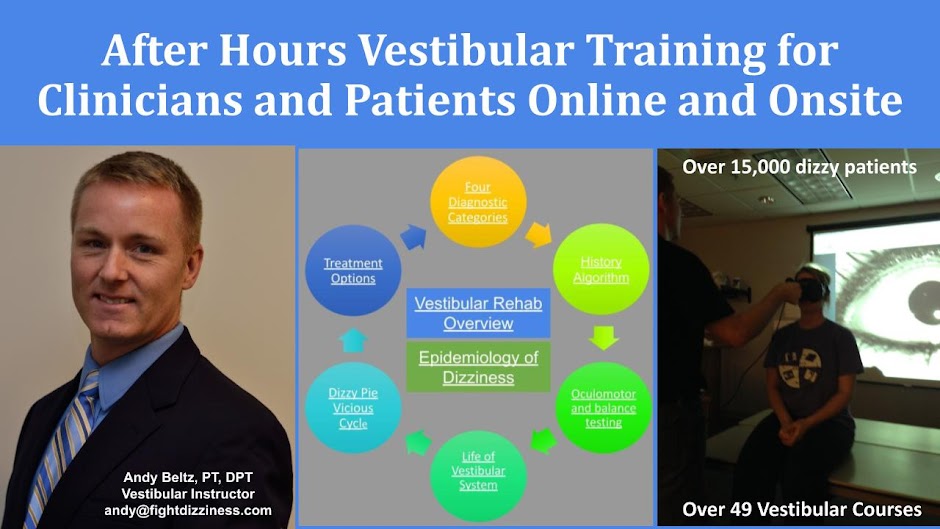Saturday, October 29, 2011
Meniere's Disease, Primary and Secondary BPPV
all battled by the same individual is a double whammy. Not only does the individual have to deal with the undpredictable nature of the Meniere's Disease and the destruction that follows leading to secondary BPPV, but they also have to deal with primary BPPV in the opposite ear. This individual has led me to wonder if they could also be battling primary and secondary BPPV in the same ear because of the way in which her spells sometimes return.
Thursday, October 27, 2011
Biofeedback and competition
are powerful tools when it comes to making progress in physical therapy. Using functional competitive activities than can be measured allows individuals to understand how well they are doing while participating in meaningful events.
Tuesday, October 25, 2011
You can't have good balance unless
you are willing to lose your balance.
Thursday, October 20, 2011
Traveling without a GPS...or a map
is similar to trying to walk without having a properly working vestibular system. We have a built in GPS system in our inner ears and brain. Just like a GPS helps us understand where we are and how to get where we want to go, our inner ears work with our brain to help us recognize where we are in space. This system also helps us understand how fast we are moving and it helps keep us going in the proper direction.
The inner ears and brain are not the only movement guides that helps us know where we are. We also have sensors in our joints that allow us to know where our joints are (bent or straight) and how fast they are actually moving.
The inner ears and brain are not the only movement guides that helps us know where we are. We also have sensors in our joints that allow us to know where our joints are (bent or straight) and how fast they are actually moving.
Sunday, October 16, 2011
Is your dizzy pie still cooking?
If you take the pie out of the oven before it is done, it will be cold and it won't taste very good. If you keep the pie in the oven too long, it will be charred and will loose it's flavor.
When individuals are battling dizziness, they often times are dizzy for more than one reason. There are several "pieces" to their "dizzy pie." It is not uncommon for me to find four or five different reasons that a person is experiencing their different sensations of dizziness. Whether or not I am able to help them with physical therapy depends upon whether or not their pie is done cooking. In other words, if the causes of their dizziness have not finished running their course or have been present for too long, the likelihood of complete relief declines.
When individuals are battling dizziness, they often times are dizzy for more than one reason. There are several "pieces" to their "dizzy pie." It is not uncommon for me to find four or five different reasons that a person is experiencing their different sensations of dizziness. Whether or not I am able to help them with physical therapy depends upon whether or not their pie is done cooking. In other words, if the causes of their dizziness have not finished running their course or have been present for too long, the likelihood of complete relief declines.
Saturday, October 15, 2011
Vestibular Rehab online continuing education seminars
are coming soon from fightdizziness.digitalchalk.com! We are excited about the opportunity to share our knowledge on dizziness and balance management. These online courses will be available on demand. Videos will be used to explain concepts relating to vestibular rehabilitation to help the learner feel as though they are present watching the speaker in person. Quizes will be provided to help assure the learner understands the content and a course completion certificate will be provided upon successful completion of the course. Physical and Occupational Therapy board approval will be sought so that these courses will count toward continuing education requirements. Feel free to email Andy Beltz, PT at andy@fightdizziness.com if you have any questions.
Friday, October 14, 2011
Intermittent strabismus, a vestibular hypofunction and secondary BPPV
all together create a variety of different types of dizziness and challenges to promote recovery. Intermittent strabismus creates a perception of either double vision or blurred vision, a vestibular hypofunction often gives individuals a feeling like things have to "catch up" when they turn their heads. In addition, a vestibular hypofunction can cause individuals to feel off balance and "funny in the head" when walking through a grocery store. BPPV creates a sense of spinning and imbalance when the head is moved during activities such as: bending over to tie one's shoes, reaching into the cupboard, lying down and rolling over in bed.
I recently worked with an individual battling all three of these problems. The intermittent strabismus would often worsen during X1 viewing exercises which impairs the brains ability to improve the gain of the vestibulo-ocular reflex.
I recently worked with an individual battling all three of these problems. The intermittent strabismus would often worsen during X1 viewing exercises which impairs the brains ability to improve the gain of the vestibulo-ocular reflex.
Saturday, October 8, 2011
One of the keys to battling dizziness is to
Subscribe to:
Comments (Atom)

